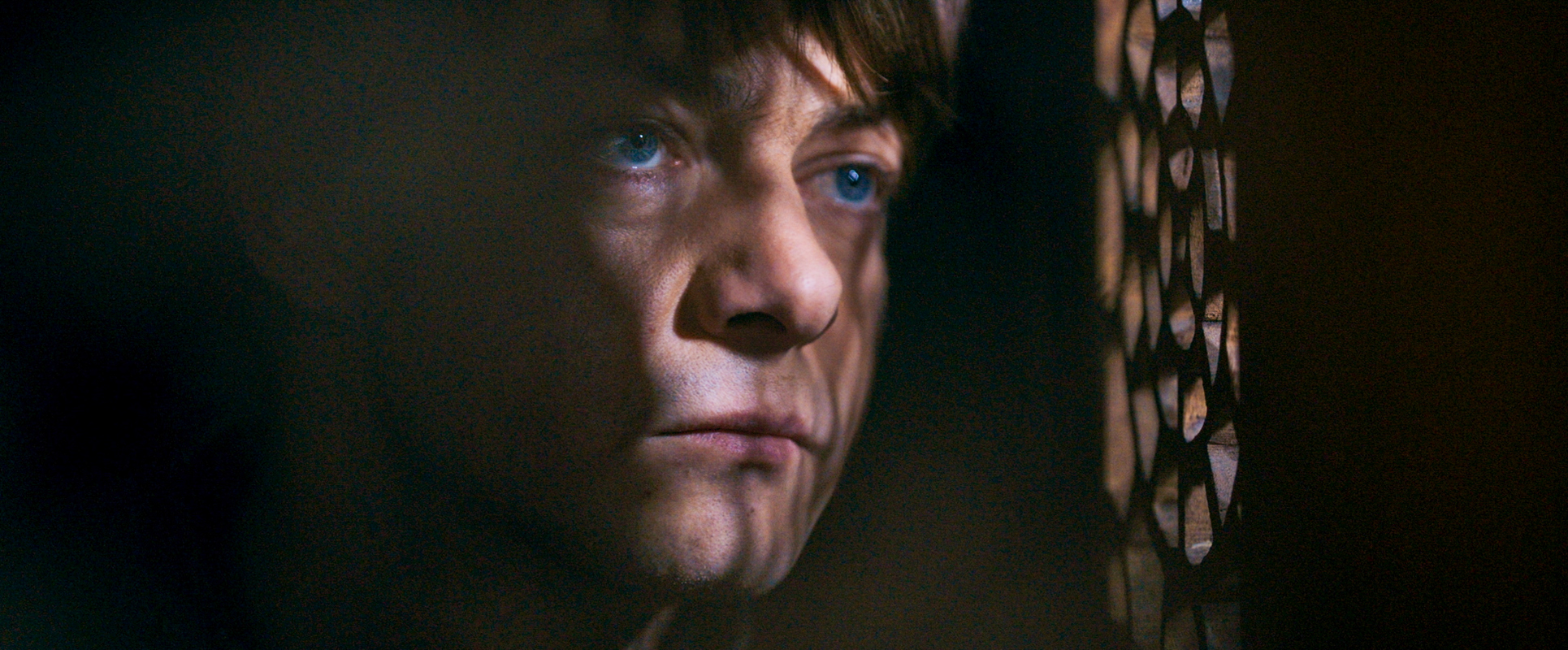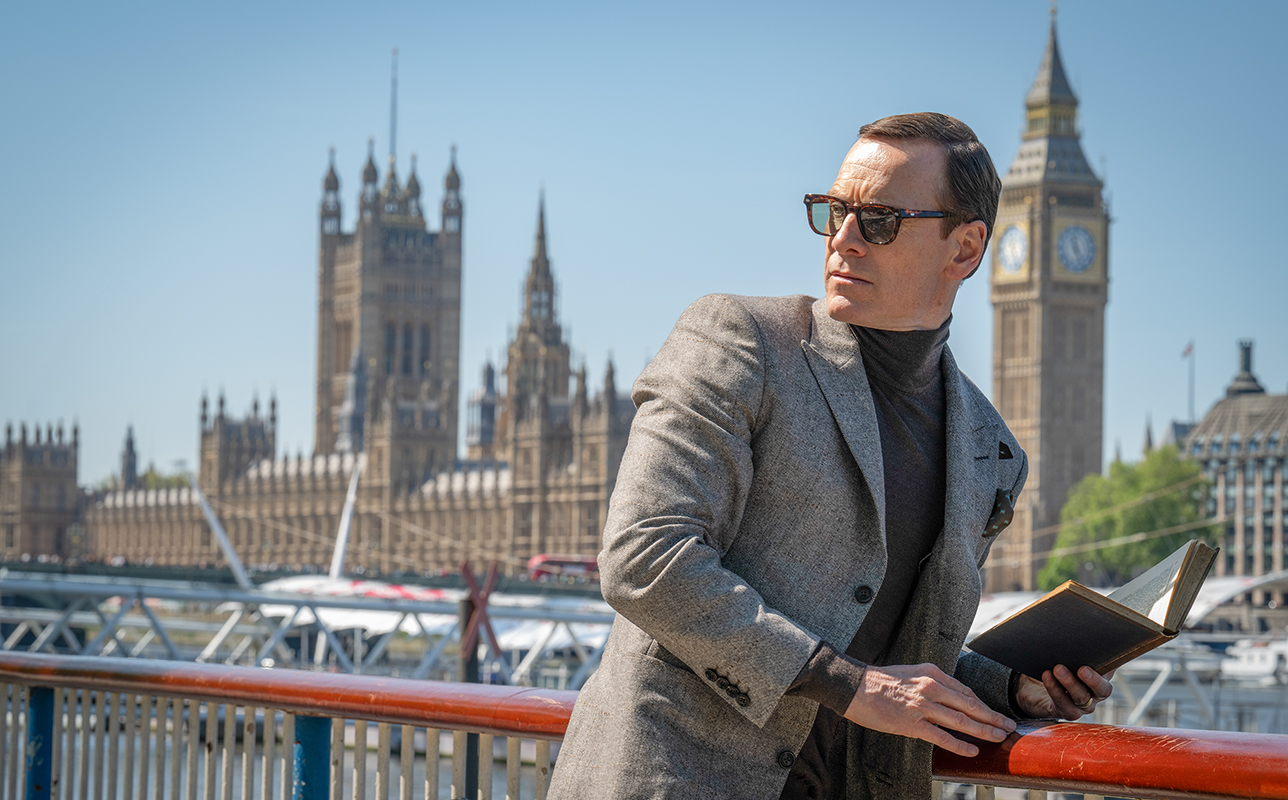‘A Complete Unknown’: Can a Biopic Capture Dylan’s Contradictions?
Timothée Chalamet stars as Bob Dylan in "A Complete Unknown," a biopic that struggles to make the folk legend knowable.
By Zach Schonfeld on December 23, 2024

During the first act of A Complete Unknown, the splashy new biopic about Bob Dylan, the songwriter gets into a fight with his girlfriend, Sylvie Russo, a character based on the real-life Suze Rotolo. Sylvie (Elle Fanning) is frustrated that her evasive new beau (Timothée Chalamet) keeps his backstory a secret.
“You never talk about your family, your past!” Sylvie protests, calling him “a mysterious minstrel.” Dylan retorts, “People make up their past, Sylvie! They remember what they want, they forget the rest.”
Sylvie’s critique reverberated through my head as A Complete Unknown marched towards its preordained climax, ticking off a grab-bag of nostalgic Boomer pleasure centers along the way. Despite the impressive efforts of Chalamet, filmmaker James Mangold, screenwriter Jay Cocks, and a fine supporting cast, Dylan remains an enigma, as unknowable to the audience as he is to his lover.
It’s all there in the title, with its myriad meanings — a playful wink to “Like a Rolling Stone,” a reference to the songwriter’s roots as a folkie nobody from Minnesota, but also, perhaps, a commentary on this icon’s fundamental unknowability. Complete unknown, indeed.
How do you make a movie about a guy who’s a tangle of contradictions, more myth than man? In 2007, Todd Haynes answered this question with I’m Not There, a kind of biopic as collage, as fragmented as the man himself. That film was easier to admire than love for its subversion of biopic tropes, and it bombed at the box office. Its overarching message — you can’t make a normal biopic about this guy! — proved incompatible with the Normal Biopic Industrial Complex.
Inevitably, Hollywood decided Dylan was ripe for a more conventional treatment, and they found the guy for the job in Mangold, who, two decades ago, helped inaugurate Hollywood’s unending glut of music biopics with Walk the Line, a deserved classic of the genre.
Wisely, A Complete Unknown resists the sprawling career-spanning arc — Chalamet is hardly primed to play ’80s born-again Dylan — and zooms in on a pivotal period from 1961, when a teenage Dylan first arrived in New York, to 1965, when he shocked the folk establishment by going electric.
During the opening sequence, the young folkie hitchhikes to New Jersey to visit his ailing idol, Woody Guthrie (Scoot McNairy). There, he befriends folksinger/activist Pete Seeger (Edward Norton), who takes the young talent under his wing, becoming a mentor as Dylan navigates the Greenwich Village folk scene.
If anyone deserves Oscar buzz here, it’s Norton, who embodies Seeger with a kind of paternal, benevolent gravity that curdles into stodgy traditionalism during the third act, as Dylan breaks with the establishment. If the character’s involvement in Dylan’s early career is overstated a bit, it instills the film with a compelling changing-of-the-guard arc.

Dylan makes a name for himself performing at downtown clubs like the Gaslight, where he catches the attention of both Joan Baez (Monica Barbaro), who becomes his collaborator and tumultuous lover, and Albert Grossman (Dan Fogler), his tough-minded manager. Fame comes quickly, earning him the right to record his original tunes but compromising his privacy, and we get the obligatory sequences of Dylan mobbed by female fans in a cab outside his apartment and squabbling with Baez onstage during a fraught tour.
Mangold is a skilled, inventive director, and he captures the ’60s milieu with stunning visual flourishes. A vibe shift arrives as 1964 turns into 1965; a sense of revolution suffuses the air, and there’s a remarkable sequence of Dylan, shades on, roaming the Village, nabbing a siren whistle (as heard in “Highway 61 Revisited”) from a streetseller, and then speeding away on his motorcycle, as throbbing jazz cacophony fills the air.
Mangold frequently frames the singer at a remove from his contemporaries — a long shot of Dylan onstage at Newport with Baez emphasizes a microphone between their faces, symbolizing the vast gulf separating them.
Chalamet performs a plethora of Dylan tunes throughout the film — he spent years training with dialect and harmonica coaches, and his vocals are all done live, apparently, with vintage microphones and solid simulacrums of Dylan’s wheezy voice.
As in Walk the Line, Mangold has a knack for staging mini psychosexual dramas within the the songs themselves. As Dylan sounds out “Blowin’ in the Wind” in Baez’s apartment, for instance, her irritation with this arrogant wunderkind melts, and she impulsively starts singing along on harmony.
And yet, A Complete Unknown can’t quite figure out who Dylan was or what made him tick. Where did those songs come from? A sequence of the man viewing newsreel footage of the Cuban Missile Crisis, then writing “Masters of War” offers a facile narrative.
Chalamet delivers disaffected Dylanisms like “They should just shut the fuck up and let me be” in a distractingly nasal-pinched imitation of Dylan’s voice. He is never wholly convincing as Dylan. He looks too much like, well, Timothée Chalamet — too pretty, too delicate — and plays the character as a set of surly, brooding glances that fail to capture Dylan’s mischievous humor. The film suggests that Dylan’s essence lies in his defiant, iconoclastic attitude, but Mangold — a committed crowd-pleaser — can’t quite match that energy as a director.
As A Complete Unknown culminates in a remarkable recreation of Dylan’s electric set at the 1965 Newport Folk Festival, it’s hard for Mangold to resist glaring factual errors (an audience member shouts “Judas,” which actually occurred in England) or escape Walk the Line‘s shadow.
There are playful callbacks (in the 2005 film, Johnny Cash writes to a young folksinger named Bob Dylan; here, we see Dylan receiving Cash’s letter) and structural parallels. Both films depict the hero navigating a love triangle between a woman he lives with (Sylvie) and a more worldly woman with whom he performs (Baez), and both climax with a heady recreation of an iconic 1960s performance instilled with anti-establishment significance. (Cash even emerges as a supporting player during A Complete Unknown‘s third act, encouraging Dylan to break all the rules.)
And yet Chalamet lacks the presence and suspension of disbelief that Joaquin Phoenix summoned as Cash in Walk the Line. Chalamet is a generational talent in his own right, but here he looks like a model dressed in a Dylan Halloween costume. It’s a good Halloween costume — the kind that turns heads at parties and gets a lot of Instagram likes. But no one’s going to confuse it for the real thing.
A Complete Unknown (★★★☆☆) opens nationwide on Wednesday, Dec. 25. Visit www.fandango.com.
Gay French Thriller ‘Misericordia’ is Creepy and Suspenseful
Alain Guiraudie's queer thriller "Misericordia" subverts its simple domestic setup with secrets, lies, and hidden desire.
By André Hereford on April 13, 2025 @here4andre
Serene on the surface, seething with desire beneath, Alain Guiraudie's French thriller Misericordia is fascinatingly strange, creepy, and suspenseful.
Much as the filmmaker's masterful 2013 thriller Stranger by the Lake planted a sinister seed by setting a serial killer loose in a tranquil outdoor gay cruising spot, here Guiraudie upends a seemingly wholesome homecoming in the countryside with dark undercurrents of sex and violence.
Although, beyond a couple of pointed shots of male nudity and one shot of bleeding, there's little sex or violence onscreen. Merely the potential for the former and the threat of the latter linger equally over nearly every scene in this odd chamber piece set in a remote village tucked amid the forested hills of Occitanie in Southern France.
‘Black Bag’ is a Slam-Bang Thriller from Steven Soderbergh
Steven Soderbergh's spicy spy thriller "Black Bag" comes packed with sharp twists, intrigue, and innuendo.
By André Hereford on March 16, 2025 @here4andre
Most A-list filmmakers in the streaming era would be glad, and lucky, to have one decent feature hit theaters in a year. So, snaps up to Steven Soderbergh, back with his second slam-bang film this season, following up January's nifty haunted house thriller Presence with the wily spy thriller Black Bag.
Soderbergh and Presence screenwriter David Koepp load up the sex, lies, and video files for this taut tale of a search for the snake hiding within a nest of secret agents. The top agent, George Woodhouse, portrayed with cool determination by Michael Fassbender, is tasked with rooting out a mole embedded in a black-ops division of British intelligence. Among his list of suspects is his own wife, Kathryn, played with a sly glint in her eye by a brashly brunette Cate Blanchett.
Celebrities Urged to Boycott Hungary Over Pride Ban
A British pro-LGBTQ advocacy group is calling on Chappell Roan, Emeli Sandé, and others to stand up against Hungary's anti-LGBTQ crackdown.
By John Riley on March 31, 2025 @JRileyMW
The Peter Tatchell Foundation is calling on celebrities scheduled to perform in Hungary to boycott the country in response to the passage of a ban on Pride marches and parades, and government surveillance, using facial recognition software, of people who attend such events.
Hungary's ruling conservative Fidesz party -- led by the virulently anti-gay Prime Minister Viktor Orbán -- recently passed the ban targeting Pride-themed celebrations.
Backers of the legislation claim the measure is needed to "protect children" from being exposed to homosexuality. Those found to have violated the law by attending Budapest Pride can be subjected to fines of up to 200,000 forints ($538).
Support Metro Weekly’s Journalism
These are challenging times for news organizations. And yet it’s crucial we stay active and provide vital resources and information to both our local readers and the world. So won’t you please take a moment and consider supporting Metro Weekly with a membership? For as little as $5 a month, you can help ensure Metro Weekly magazine and MetroWeekly.com remain free, viable resources as we provide the best, most diverse, culturally-resonant LGBTQ coverage in both the D.C. region and around the world. Memberships come with exclusive perks and discounts, your own personal digital delivery of each week’s magazine (and an archive), access to our Member's Lounge when it launches this fall, and exclusive members-only items like Metro Weekly Membership Mugs and Tote Bags! Check out all our membership levels here and please join us today!
The Magazine
-
Most Popular
 "Senate Twink" Says Video Sex Scandal Drove Him to Flee U.S.
"Senate Twink" Says Video Sex Scandal Drove Him to Flee U.S.  Abigail Spanberger Backed by HRC in Virginia Governor Bid
Abigail Spanberger Backed by HRC in Virginia Governor Bid  Gay Army Reserve Officer in Uniform Sex Video Scandal
Gay Army Reserve Officer in Uniform Sex Video Scandal  Nick Cave: The Wizard of Art
Nick Cave: The Wizard of Art  'Boop! The Musical' Is Broadway’s Happiest Surprise
'Boop! The Musical' Is Broadway’s Happiest Surprise  'Porn Star University' Started by Gay-for-Pay Creator Andy Lee
'Porn Star University' Started by Gay-for-Pay Creator Andy Lee  Lesbian Firefighter Awarded $1.75 Million in Lawsuit
Lesbian Firefighter Awarded $1.75 Million in Lawsuit  Sarah Snook is Astonishing in Broadway's 'Dorian Gray'
Sarah Snook is Astonishing in Broadway's 'Dorian Gray'  Trans Women Not Legally 'Women,' UK Supreme Court Rules
Trans Women Not Legally 'Women,' UK Supreme Court Rules  Police Barge into Walmart Restroom to Confront Butch Lesbian
Police Barge into Walmart Restroom to Confront Butch Lesbian
 "Senate Twink" Says Video Sex Scandal Drove Him to Flee U.S.
"Senate Twink" Says Video Sex Scandal Drove Him to Flee U.S.  Abigail Spanberger Backed by HRC in Virginia Governor Bid
Abigail Spanberger Backed by HRC in Virginia Governor Bid  Lesbian Firefighter Awarded $1.75 Million in Lawsuit
Lesbian Firefighter Awarded $1.75 Million in Lawsuit  Nick Cave: The Wizard of Art
Nick Cave: The Wizard of Art  Trans Women Not Legally 'Women,' UK Supreme Court Rules
Trans Women Not Legally 'Women,' UK Supreme Court Rules  Chef’s Best Is A Culinary Extravaganza For A Cause
Chef’s Best Is A Culinary Extravaganza For A Cause  This Week's Advertisers: Nick Cave - April 17, 2025
This Week's Advertisers: Nick Cave - April 17, 2025  Off-Broadway's 'All the World’s A Stage' Is Tender, Timely, and True
Off-Broadway's 'All the World’s A Stage' Is Tender, Timely, and True  'Boop! The Musical' Is Broadway’s Happiest Surprise
'Boop! The Musical' Is Broadway’s Happiest Surprise  Naples Pride Sues City Over Drag Show Ban
Naples Pride Sues City Over Drag Show Ban
Scene
Metro Weekly
Washington's LGBTQ Magazine
P.O. Box 11559
Washington, DC 20008 (202) 638-6830
About Us pageFollow Us:
· Facebook
· Twitter
· Flipboard
· YouTube
· Instagram
· RSS News | RSS SceneArchives
Copyright ©2024 Jansi LLC.











You must be logged in to post a comment.